2021 年四川绵阳英语中考试题及答案
本试卷分试题卷和答题卡两部分。试题卷共 8 页,答题卡共 2 页。满分 120 分,考试时间
100 分钟。
注意事项:
1.答题前,考生务必将自己的姓名、准考证号用 0.5 毫米的黑色墨迹签字笔填写在答题卡
上,并认真核对条形码上的姓名、准考证号、考点、考场号。
2.选择题答案使用 2B 铅笔填涂在答题卡对应题目标号的位置上,非选择题答案使用 0.5
毫米的黑色墨迹签字笔书写在答题卡的对应框内。超出答题区域书写的答案无效;在草稿纸、
试题卷上答题无效。
3.考试结束后,将试题卷和答题卡一并交回。
第一节:阅读理解(共 20 小题,每小题 2 分,满分 40 分)
第 I 卷(选择题,共 70 分)
阅读下面短文,从每题所给的四个选项(A、B、C 和 D)中,选出最佳选项,并在答题卡上
将该项涂黑。
A
It's half past seven on Monday morning: time to get ready for school. Jay Stone
rolled out of bed. He did a couple of quick wake-up exercises and then he went over
to a mirror and looked at himself.
“Not bad, Stone, not bad,” he said to himself and smiled. Maybe he wasn't ready
for Hollywood, but with his dark broad eyes and his thick brown hair, he had the
looks that turned girls’ heads. He moved in closer to the mirror and smiled, checking
his teeth.
“Perfect,” he thought, “Good enough for a toothpaste ad.”
As his eyes moved down to his strong arms and chest he smiled again. The hours
he spent on the playground and doing sit-ups have paid off!
But suddenly, the smile froze(僵住)on his lips. His eyes moved from the upper
part of his body down to his legs. His legs were short. Not just short, but far too
short for his body. He had the upper body of a six feet boy, but because of his legs,
he was much less than six feet. Sitting, he was as tall as almost anyone in his class.
�
Standing, he had to look up at most of the boys and even many of the girls.
Why didn't his legs grow with the rest of his body? At five feet six inches(英
寸), he was one of the shortest boys in his class. He was the shortest in his own
family, and he was even shorter than his little sister — by three inches! Where
did his legs come from?
He certainly didn't get them from his parents. They were both quite tall. Looking
through old photos in the family album, he found the answer. It was his grandfather
on his mother's side. His short legs were a gift from Grandpa Tuttle. Thanks a lot,
Grandpa!
1. How did Jay Stone feel about his upper body?
A. Disappointed.
B. Interested.
C. Proud.
D.
Uneasy.
2. How tall was Jay's little sister?
A. Six feet.
B. Five feet six inches.
C. Five feet nine inches.
D. Five feet three inches.
3. Why did Jay's smile disappear suddenly?
A. Because he disliked his arms.
B. Because he was upset that his legs were short.
C. Because he found something wrong with his face.
D. Because he thought he wasted a lot of time exercising.
4. What is true according to the passage?
A. Jay's parents had short legs.
B. All the other students were taller than Jay.
C. Most boys in Jay's class looked up to him.
D. Jay was shorter than any other member in his family.
5. What can we learn about Jay's grandfather?
A. His mother was short.
B. He had short legs as Jay did.
C. He was crazy about taking photos.
D. He left gifts for his family members.
B
�
NOTICE 1
NOTICE 2
June 11, 2021
June 11,
2021
CALL FOR CREATIVE WRITINGS!
This is to
INTER-SCHOOL SINGING COMPETTTION!
inform all the students that our
school
Our
school
is
going
to
hold
an
is
going
to
publish
Inter-school
Singing Competition on
its
yearly
magazine next month. All
June 29,
2021,
Tuesday
at 2 pm in the
those who wish
to have a go can mail
school hall. More than 20 schools
from
their articles to
xysmagazine @ gmail.
all over the city will
take part in
com. Students’ works
will be accepted
it.
Interested students may call us at
latest by June 30,2021till 11:59 pm. You
66882021latest by June 18, 2021.
can take any topic of your choice. For
Alice/Albert
more information,get in touch with your
Head Girl/Head Boy
own class teachers.
Asma/Ashish
Head Girl/Head Boy
June 11 , 2021
FOUND!
NOTICE 3
This is to inform all the students that a backpack has been found in the school
playground.
There are a few textbooks and some money in it.
The backpack is
medium-sized and red in
colour.
It was found on June 9, at around 6 pm in a corner
near the main gate. The owner of
the bag shall see me in the School Office with
your ID card.
Thank you.
Amar/Amrita
Head Girl/Head Boy
6. What does NOTICE 1 tell its readers?
A. The magazine will come out at the end of June.
B. The school is going to publish its first magazine.
C. The teachers choose what to be put in the magazine.
�
D. The students have a chance to become published writers.
7. Who should you turn to if you want to take part in the singing competition?
A. Asma.
B. Amrita.
C. Albert.
D. Amar
8. Why does NOTICE 3 describe the backpack?
A. To show its difference.
B. To tell the value of it.
C. To interest the students.
D. To help find the owner.
9. How can you get back the backpack?
A. To call 66882021.
B. To go to the School Office.
C. To visit xysmagazine@ gmail. com.
D. To search the school playground.
10. Where do you most probably see these notices?
A. On a classroom noticeboard.
B. On a school noticeboard.
C. On the wall of a bus station.
D. On the wall of a shopping mall.
C
Habits and field paths(小径)are formed in the same way: by repetition. Villagers,
as a rule, do not purposefully make a foot path to the next village. They just go
the shortest or easiest way over the fields. Day after day a people go and come the
same way. Their feet beat the earth hard. By their repeated walking in the same
direction a path is made. Similarly, the more often we do anything in the same way
or at the same time, the more we shall do it that way. At last a habit is formed.
Usually it is much easier to form bad habits than good habits. The reason is
simple – we are just lazy. For example, it is easier to lie in bed on a cold morning
than to get up early. It is easier to put off today's duties to tomorrow than to
do them at the right time.
Bad habits are not formed in a day, and it is the same with good habits. The
forming of good habits needs time and calls for effort and hard work at first; but
every time we do the right thing, it makes doing the same thing next time much easier.
It's really hard to get up early on a cold winter morning for the first time. However,
if you keep doing it every day for some time, it will become “a piece of cake”
in the end. At last, we form the good habit ,which would be hard to break even if
we wanted to break it.
�
Get into the habit of early rising, and you will not want to lie in bed like
a lazybone. Get into the habit of telling the truth, and you will find it really
hard to tell a lie. Get into the habit of doing today's work today, and you will
feel uncomfortable if you have to put anything off till tomorrow.
11. Why is foot-path making mentioned repeatedly?
A. To lead in the topic.
B. To draw a picture of country life.
C. To ask people to go back to nature.
D. To compare habits with field paths.
12. What question is answered in Paragraph 2?
A. How are bad habits formed?
B. Why are good habits harder to form?
C. Why is it easier to develop bad habits?
D. How are bad habits different from good ones?
13. What's the most important to form good habits?
A. Getting up early on a cold winter morning.
B. Doing the right thing and making it easier.
C. Working hard first and taking it easy gradually.
D. Getting started and keeping doing it for some time.
14. What is Paragraph 4 mainly about?
A. Formed good habits are here to stay.
B. It is not right for anyone to tell a lie.
C. Lazybones have no future in their lives.
D. Never put things of today off to tomorrow.
15. What would be a good title for this passage?
A. How Habits Are Formed
B. How Habits Shape People's Life
C. Connections Between Habits and Paths
D. Differences Between Good and Bad Habits
D
�
A new kind of sea sponge(海绵) found in Norfolk, England, has been named by
a nine-year-old girl after a competition for local schools.
The unique purple sponge, which had never been seen in other parts of the world,
was first discovered by divers(潜水者) off the north Norfolk coast. Although found
in 2011, it had been without a name for almost ten years. In January this year, the
Marine Conservation Society (MCS)- a group of people who work to protect the UK's
seas and coast - asked local schoolchildren to come up with suggestions.
Now the sponge has a name to be proud of: parpal dumplin, as suggested by
nine-year-old Sylvie from Langham Village School. Sylvie said she came up with the
name because “the sponge is purple and it looks like a dumpling”. Parpal dumpling
is “purple dumpling” spoken in a Norfolk accent(口音). The judges all agreed that
Sylvie's suggestion should be the sponge's name because “the spelling gives the
sponge a strong connection to Norfolk”.
Sponges were once thought to be plants but they are actually simple sea animals.
They feed on tiny things in sea water and help to keep the water clean in the process.
Sponges have a very “lazy” lifestyle, with no means of moving themselves around.
They are found on the seabed, rocks or even shells. They come in all kinds of different
colours, shapes and sizes.
Parpal dumplin was first discovered in a place called the Cromer Shoal Chalk
Beds as part of a project called Seasearch. When diver Dawn Watson showed sponge
expert Claire Goodwin what she found, Goodwin was sure that it was a kind of sponge
unknown to science. Watson's discovery is a special sponge, which takes the shape
of whatever it covers. Parpal dumplin will now become its common name, and will be
used until researchers have learned enough about it to suggest an official scientific
one.
16. What does the underlined word “unique” probably mean?
A. strange and ugly
B. special and unusual
C. soft and beautiful
D. meaningful and important
17. Why was the name parpal dumplin chosen?
A. Because it sounds interesting.
�
B. Because Sylvie won the competition.
C. Because the sponge really looks like a purple dumpling.
D. Because its spelling is related to the place where it was found.
18. What can we learn about sponges from Paragraph 4?
A. They help clean up sea water.
B. They are of the same size.
C. They don't like moving around.
D. They are actually sea plants.
19. Which is true about parpal dumplin?
A. It has many colors.
B. It was found 20 years ago.
C. It has only one shape.
D. It was scientifically unknown before.
20. What do we know from the last sentence?
A. Parpal dumplin is a common sponge.
B. Parpal dumplin is the sponge's official name.
C. There's still a lot to be learned about parpal dumplin.
D. Researchers suggested an official name for the sponge.
第二节:完形填空(共 15 小题,每小题 2 分,满分 30 分)
阅读下面短文,从短文后各题所给的四个选项(A、B、C 和 D)中,选出可以填入空白处的
最佳选项,并在答题卡上将该项涂黑。
A
Lily was walking to a party through a park one afternoon in her beautiful new
dress. It was
21
, but the ground was wet from rain in the morning. She walked
near some boys and girls who were playing football in the
22
. As Lily was
walking past, the
23
hit her. It was wet and dirty, so her beautiful new dress
became wet and dirty too. The boys and girls stopped playing to see if Lily was all
right. They were very
24
, but there was nothing they could do, and there was
no time for Lily to go home and
25
. Poor Lily had to go to the party with dirty
clothes.
21. A. sunny
B. snowy
C. rainy
22. A. street
B. forest
C. school
D. windy
D. park
23. A. stone
B. bike
C. ball
D. dress
24. A. glad
B. sorry
C. scared
D. honest
�
25. A. rest
B. change
C. study
D. wash
B
Daisy was in the bathroom. She was brushing her teeth and the tap(水龙头) was
on. Water was running.
“Turn that tap off,” a voice said loudly. Daisy was shocked. She
26
,
but saw no one. “Turn that tap off. You are wasting water!” Someone shouted
27
.
This time Daisy turned off the tap and asked, “Who---who are you?”
“I am a drop of water. It's not
28
for me to get here. Do you know where
I'm from?” “From the tap?" said Daisy.
“No. A few days ago, I was flying comfortably in a cloud , enjoying the view
from the sky. Then I
29
into a river and that river carried me to a lake. Then
it was time for me to get cleaned up.” “Really?” Daisy doubted. “Yes. I was
30
after my journey. So in order to make me safe to drink, people gave me a complete
31
32
. After that, I travelled in the pipes(管道)under the streets. I waited there
you called me, and here I am.”
Daisy said, “So this is the end of your
33
?”
“No. When you've finished with me, I will be back in the sea again. That's where
I came from in the first place. Remember not to waste me or pollute me. I'm
34
,
like gold. See you.”
“Wait a minute. What do you mean by gold?” But there was no
35
. The water
had gone.
26. A. looked out
B. looked up
C. looked around
D. looked back
27. A. impatiently
B. impolitely
C. happily
D. kindly
28. A. lucky
B. comfortable
C. easy
D. fast
29. A. moved
B. stepped
C. broke
D. dropped
30. A. pleased
B. dirty
C. dangerous
D. tired
31. A. training
B. check
C. holiday
D. cleaning
32. A. until
B. though
C. because
D. if
33. A. history
B. life
C. chance
D. journey
�
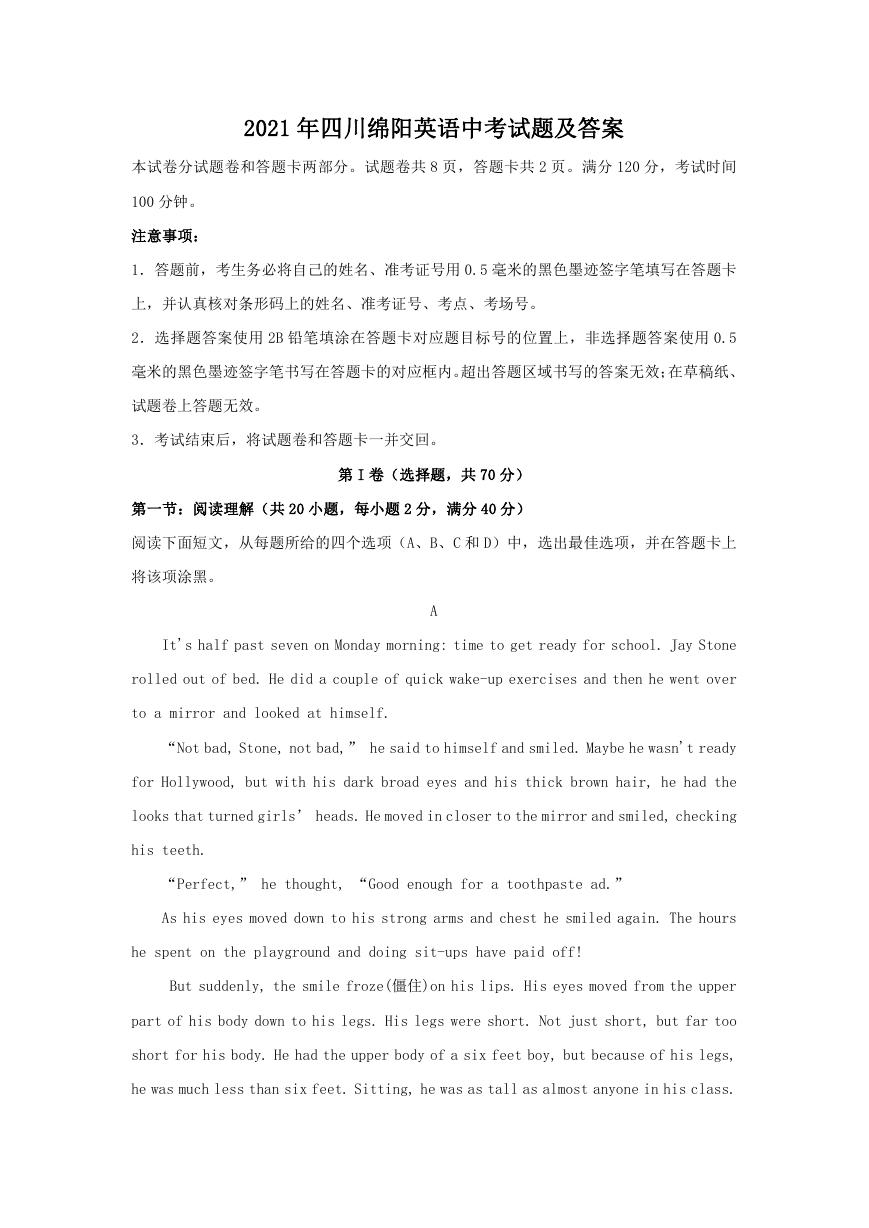
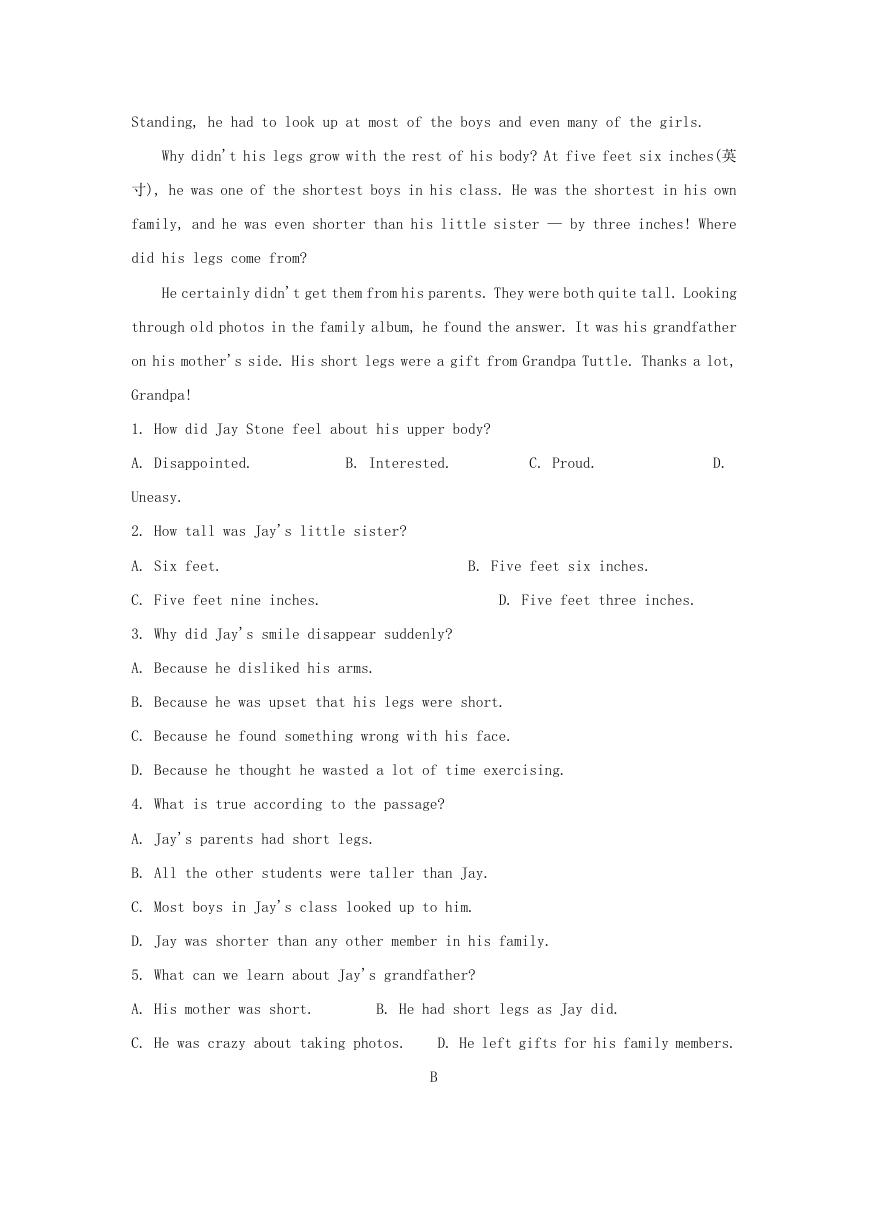
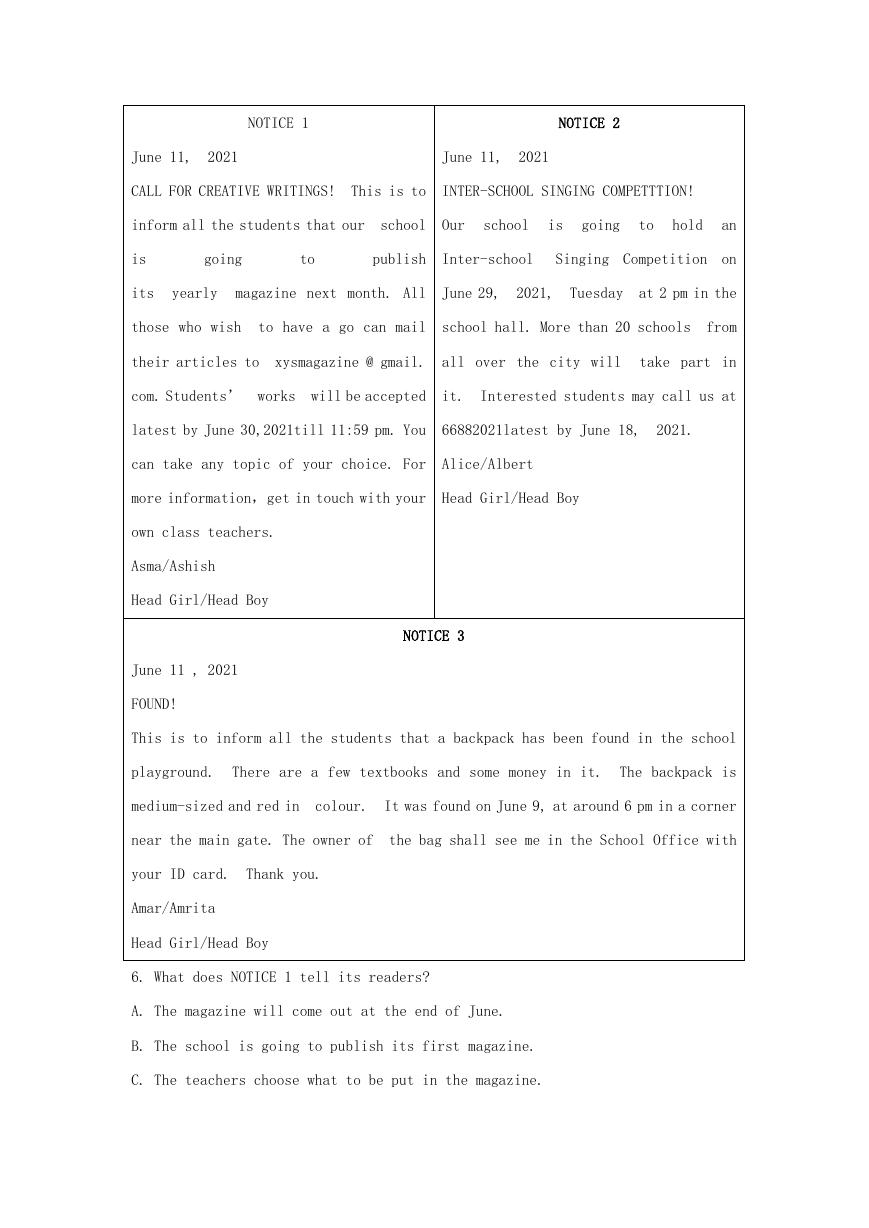
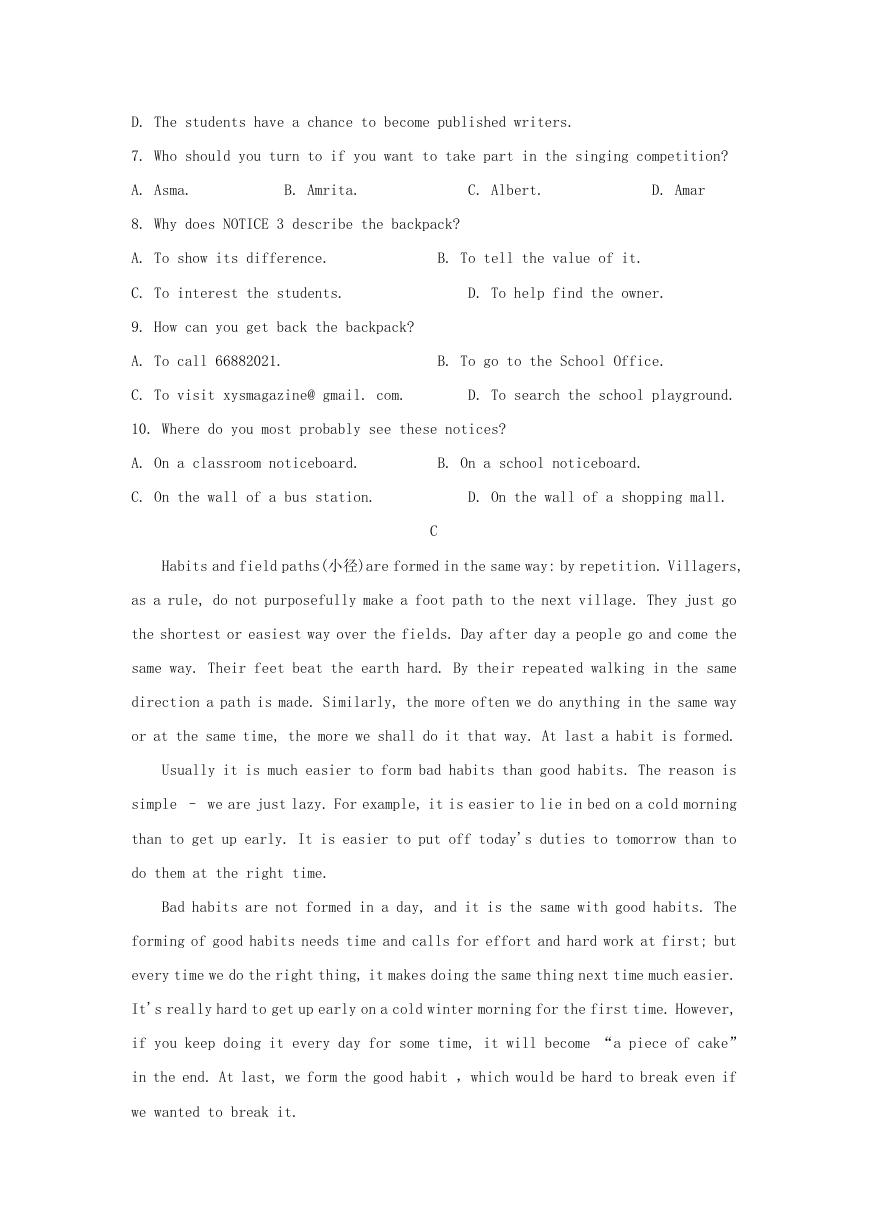
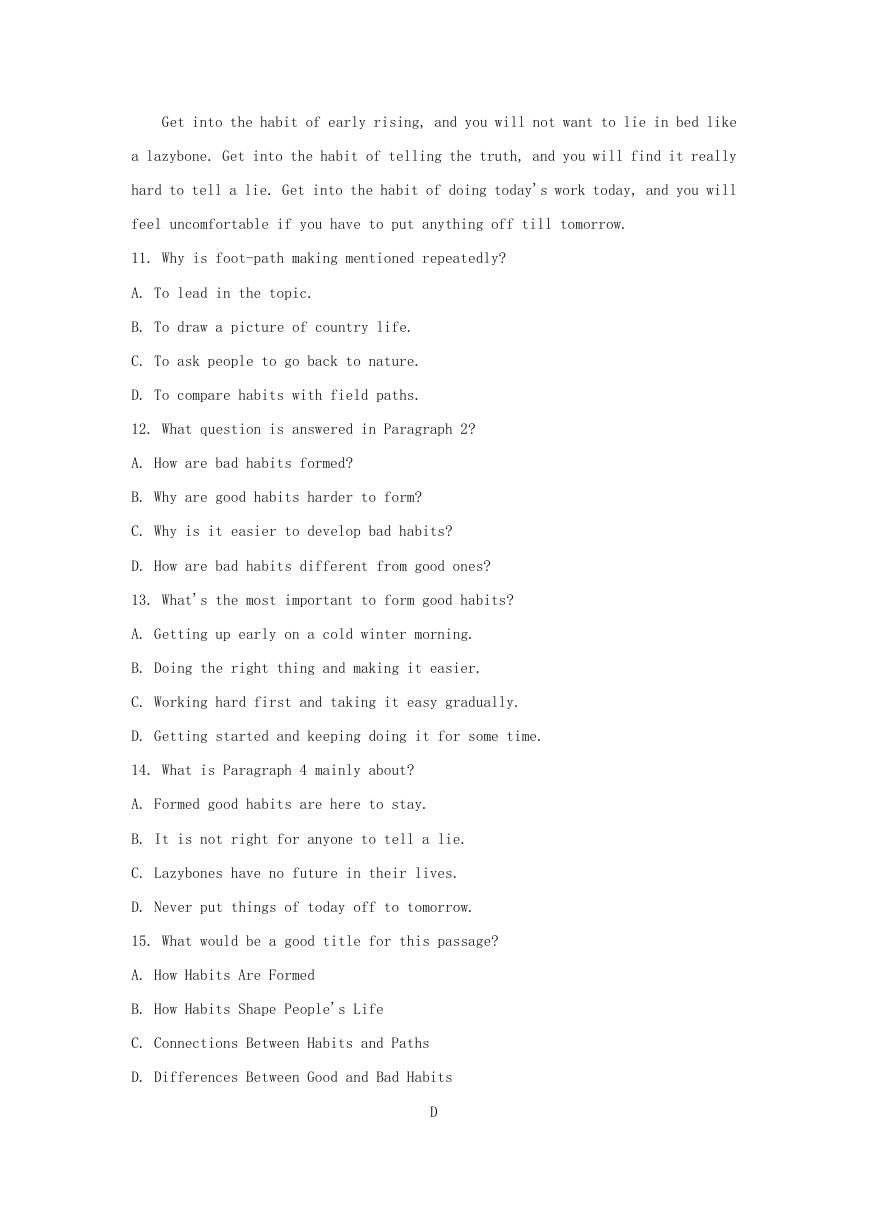
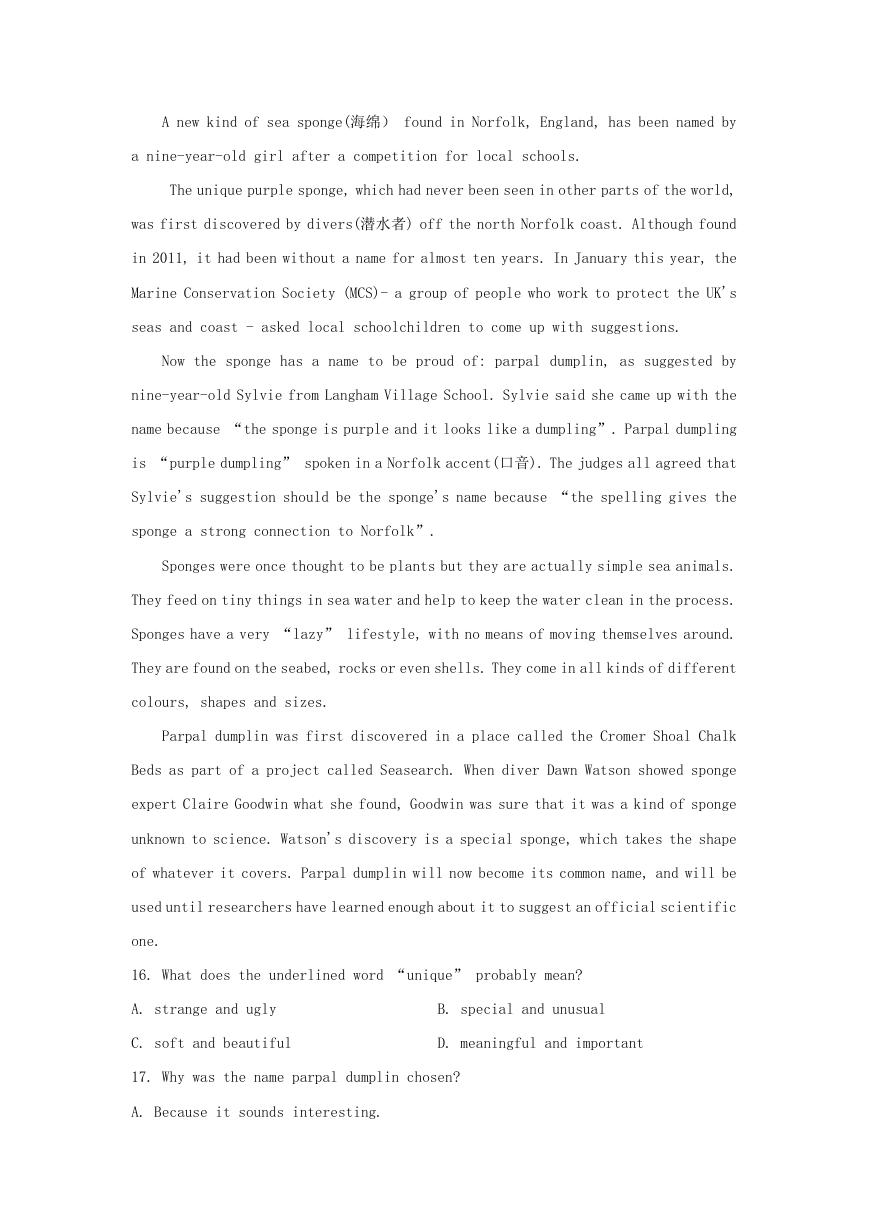
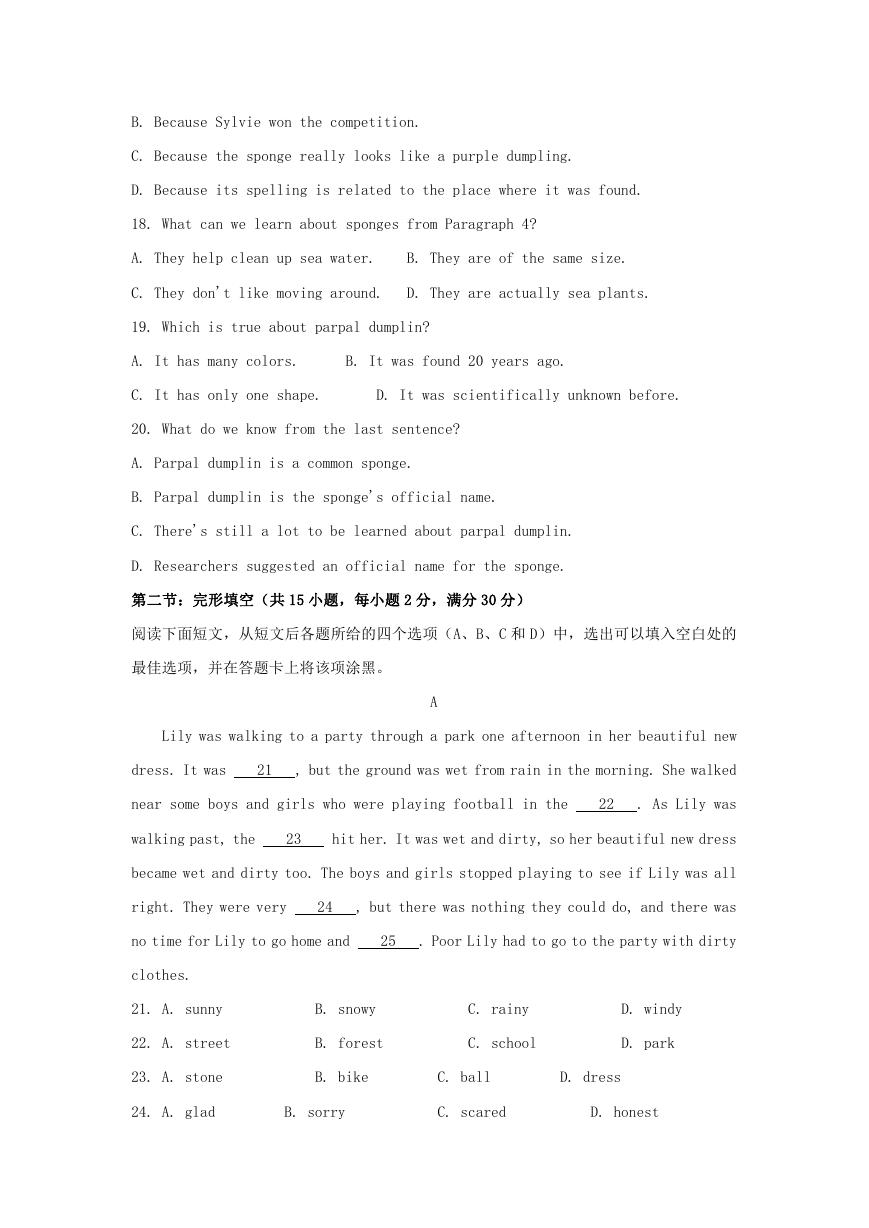
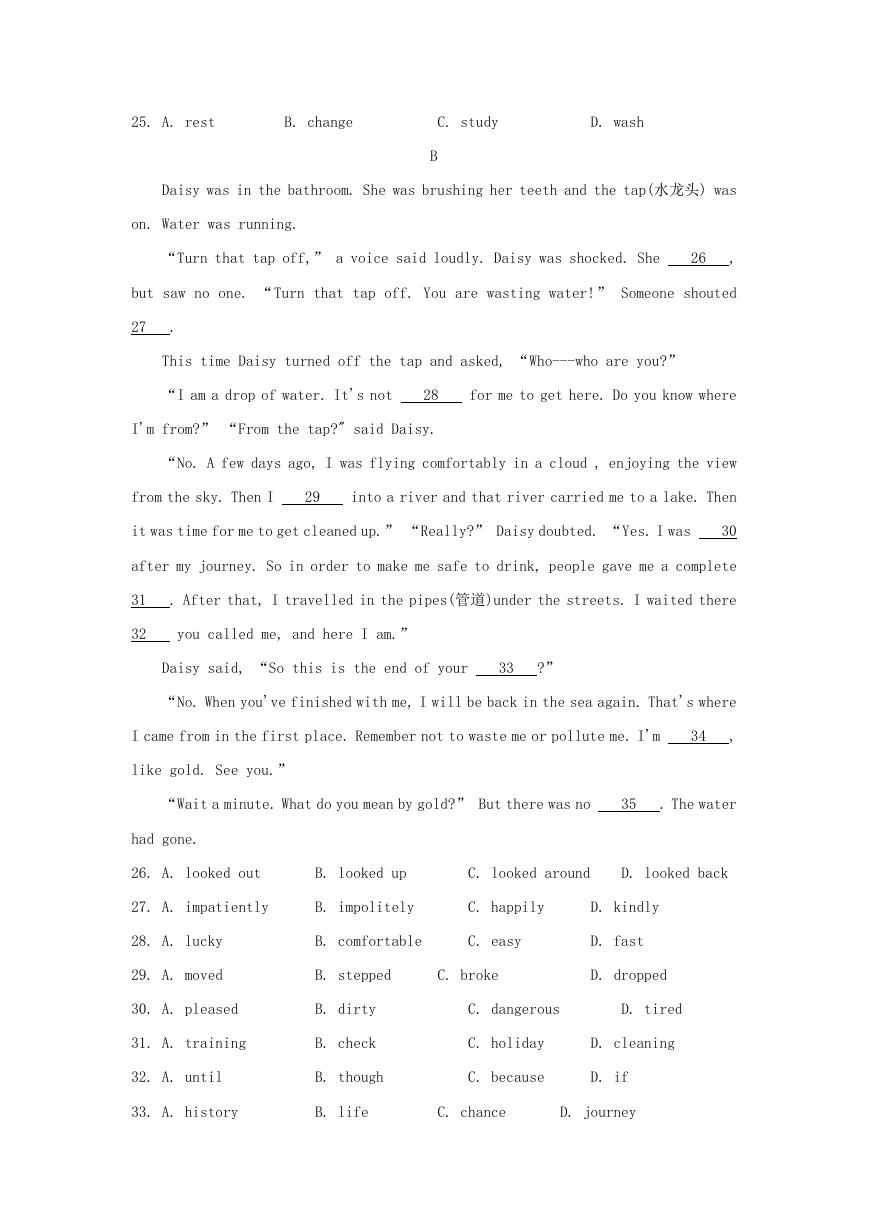








 2023年江西萍乡中考道德与法治真题及答案.doc
2023年江西萍乡中考道德与法治真题及答案.doc 2012年重庆南川中考生物真题及答案.doc
2012年重庆南川中考生物真题及答案.doc 2013年江西师范大学地理学综合及文艺理论基础考研真题.doc
2013年江西师范大学地理学综合及文艺理论基础考研真题.doc 2020年四川甘孜小升初语文真题及答案I卷.doc
2020年四川甘孜小升初语文真题及答案I卷.doc 2020年注册岩土工程师专业基础考试真题及答案.doc
2020年注册岩土工程师专业基础考试真题及答案.doc 2023-2024学年福建省厦门市九年级上学期数学月考试题及答案.doc
2023-2024学年福建省厦门市九年级上学期数学月考试题及答案.doc 2021-2022学年辽宁省沈阳市大东区九年级上学期语文期末试题及答案.doc
2021-2022学年辽宁省沈阳市大东区九年级上学期语文期末试题及答案.doc 2022-2023学年北京东城区初三第一学期物理期末试卷及答案.doc
2022-2023学年北京东城区初三第一学期物理期末试卷及答案.doc 2018上半年江西教师资格初中地理学科知识与教学能力真题及答案.doc
2018上半年江西教师资格初中地理学科知识与教学能力真题及答案.doc 2012年河北国家公务员申论考试真题及答案-省级.doc
2012年河北国家公务员申论考试真题及答案-省级.doc 2020-2021学年江苏省扬州市江都区邵樊片九年级上学期数学第一次质量检测试题及答案.doc
2020-2021学年江苏省扬州市江都区邵樊片九年级上学期数学第一次质量检测试题及答案.doc 2022下半年黑龙江教师资格证中学综合素质真题及答案.doc
2022下半年黑龙江教师资格证中学综合素质真题及答案.doc